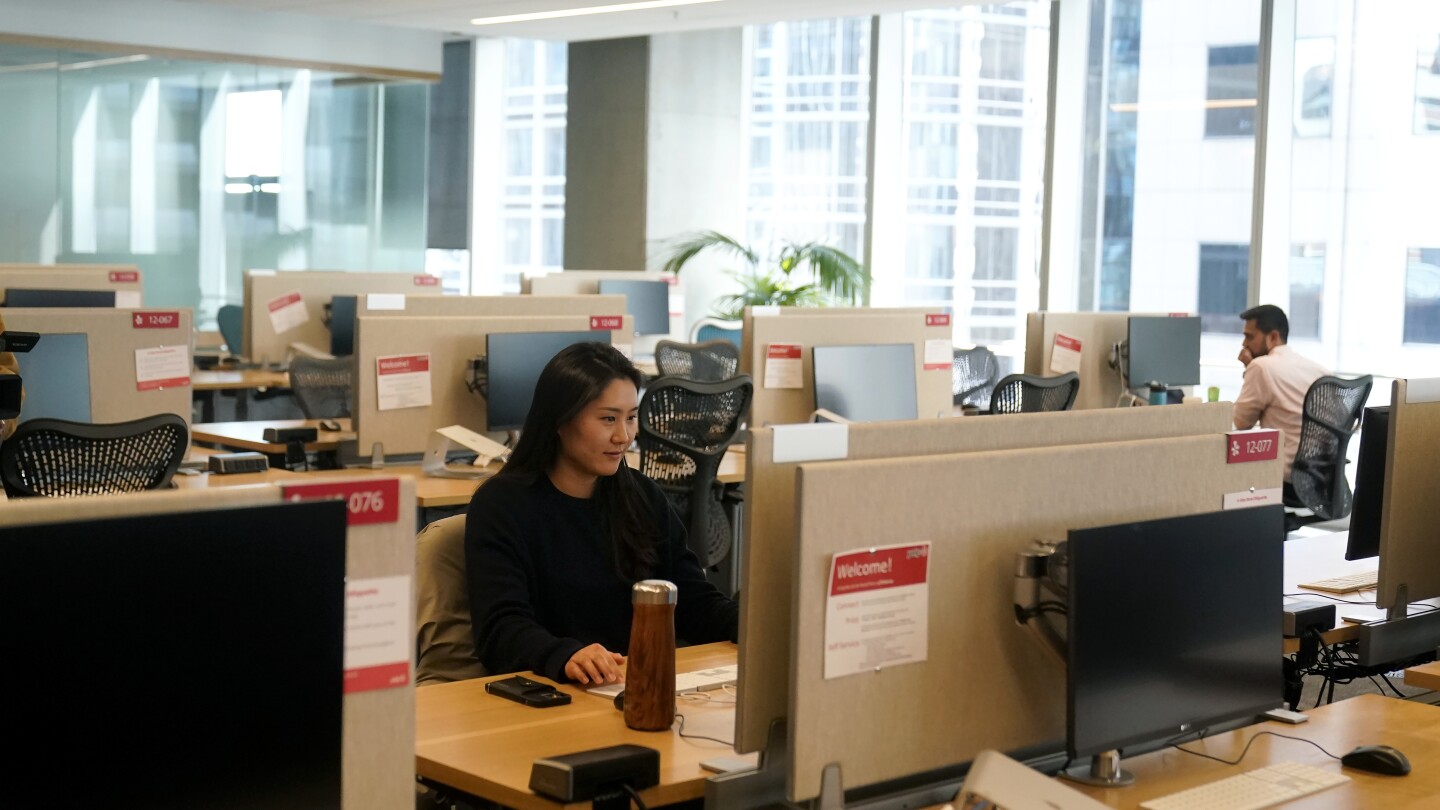[…]
Workers have since begun to return to the office in waves, at least for part of the week, and navigating that transition is an ongoing and significant hurdle for employers and workers alike. And many simply cannot fathom a return to the pre-COVID status quo, changing how companies approach their staffing needs.
Retaining employees who don’t want to work in person is an issue for companies, but relatively few employers (13%) have introduced new incentives that would make employees more satisfied with it, according to a newly released poll conducted by NORC at the University of Chicago.
About 3 in 4 human resources representatives say that retaining employees who don’t want to work in the office is a problem — including 19% who call it a “major problem.” Another 54% of HR representatives call it a minor problem. And only about one-third of HR professionals say employees at their workplace are “extremely” or “very” happy about returning to the workplace.
“Once workers discovered that (remote work could be) less expensive and… make their life a little easier, they just wanted to keep doing it, even once the pandemic began fading away,” Marjorie Connelly, senior fellow with NORC’s Public Affairs & Media Research department, told The Associated Press.
[…]
Now that my work day is 3 hours shorter because I don’t have a shit commute, the office is going to have to offer one hell of a perk to lure me back.
My commute is 0 seconds in the morning. I wake up, get rolling on my morning routine, open up my Surface, and log in to the morning meeting. I am productive instantly, and start on my workload within 30 minutes of being awake. I often finish everything needed of my department within 2.5-5 hours, with extra time to improve or fuss over details to enhance the client’s deliverable or improve UI or something.
Meanwhile, my in-office peers at other firms are just getting settled into their desks after their 2nd mandatory in-person attendance huddle meeting, sometime around 10:30 in the morning. Of course, this is followed by waiting 45 minutes in queue to pay 10$ for burnt old coffee at the cafeteria, and shuffling around a maze of corridors and 2 different elevators for 15 minutes just to get to their assigned desk for the day. Oh, and that’s after their key card for elevator 2 desync’d, so there’s been an hour of waiting around for Jan from Facilities to approve Todd from IT’s request for an authorization on a new key card, and a 40$ pay deduction from the employee for missing a key card in the first place. Of course, that’s in addition to the demerit for missing their 3rd in-person attendance huddle of the morning. By the time lunch hour hits, they’re finally logged in to their machine with just enough give-a-fuck left to sneak in Facebook memes when their manager isn’t over them looming; all while giving enough shits to ignore their actual workload because they hate it there.
Yeah, but what about free cold brew?
And the forced socialization/“were a family” activities! They rule! Really! I swear!
You mean the pot of coffee with a few gnats in it that Pedro left out overnight?
They squirted some Torani Pumpkin in it and put some Sonic ice on top. It’s now 12$.
If it’s so important, it’s pretty goddamned simple. Pay them 11 hours for 8 in the office and they’ll return.
So a pizza party then?
Exactly.
So umm…why are employers even interested in having employees return to in-person work, again? 🤨
Gotta put meat in the seats or the megaconglomerate who owns the 17 office buildings downtown might have to rethink a portion of one of their income models. Less demand for high end commercial real estate when the companies they lease to realize/ follow through on the fact 90% of them do not need the 28,000 Sq ft bullying zone they use to oppress and keep motivation and salaries low in order to function.
Plus, the cruelty and waste is the point. Also, there’s the miserable middle manager rung of humanity that only lives to make their office coworkers lick their boot by prisoner compliance who are rabid to establish the facade of purpose in their career. They don’t care if the planet, all their coworker’s families, and their company’s bottom line have to suffer for that - if they can’t loom over their underlings and slow progress with tons of detrimental comments and stupid suggestions, how will the world know they’re ‘involved’?
I’m overly grateful my firm is 100% remote. Damn.
Yeah that makes sense. The first point (real estate conglomerates) I get. But like you said, that doesn’t explain why the tenants (employers) are pushing for it. Is it really just the cruelty and waste that’s driving the employers? Also, are companies/managers really like that? That’s awful.
I suppose I’m fortunate we don’t (and won’t) have a mandatory return to office. However, I still like to go in whenever I can because it’s a good walk, our office is beautiful, and our chef makes tasty and healthy lunches. I appreciate that we’re keeping things so flexible. I do have more fun on the days more people come in!
Vitriol towards office environments and their overlords aside for a minute, here are a few of the positives the company gets from this:
There is wicked amounts of prestige in having a complex with your name on the marquee of the building. Client confidence skyrockets if you “Have a building” in a major metro.
Less ability for overemployment - you can guarantee the guy unable to get this one job finished at the office isn’t selling his spare time to the competition down the road.
More control over employee’s personal lives and psyche - if you can DEMAND that Mr. Jones be in the office instead of at his kid’s parent day lunch, and you have the building to DEMAND he report to, you’ve driven home the point to Mr. Jones that you own his life, and he is an accessory of your money making venture first, then a family man second. This can sometimes lead to the creation of unhealthy work-lifers who are extremely profitable to the firm. This is almost impossible to do when they’re at home and the oppression is harder to enforce.
It can actually be more cost effective, if you’re a large enough firm. Once you pass about 40-50 members, there are instances where you can save on things like data connectivity, equipment costs, and travel to trainings/client meetings. These costs vary wildly by industry, so the fiscal math follows suit. In many cases, it’s a cost-saving measure.
There are other factors - tax breaks, stipends from cities to occupy certain districts, nepotism, and social optics, but those are adjunct to the main purpose of getting employees back into a high-rise.
Sunk cost fallacy.
I’m paying for all this damn office real estate, so I should use it.
Management wants something to do.
They don’t know how to properly do metrics on their employees and think in person is the only way to manage people. Even execs at tech companies think this despite them rarely being in the office.
If I don’t have to waste 2.5 hours of my life every day commuting or spend money on gas for that dumbass commute, and I am subject to less pervasive monitoring by my employer… Why would I ever willingly go back?
Incentives: Ping-pong table and a pizza party.
“Due to budgetary concerns, we had to cancel the ping-pong table, so it’s just a pizza party. Please enjoy your one (1) slice of Little Caesar’s.”
And please don’t form a union!
It’s a Tornado foosball table or I’m out
I used to work for Google. You know, the company famous for having offices that are basically adult playgrounds? I still wouldn’t want to go back.






